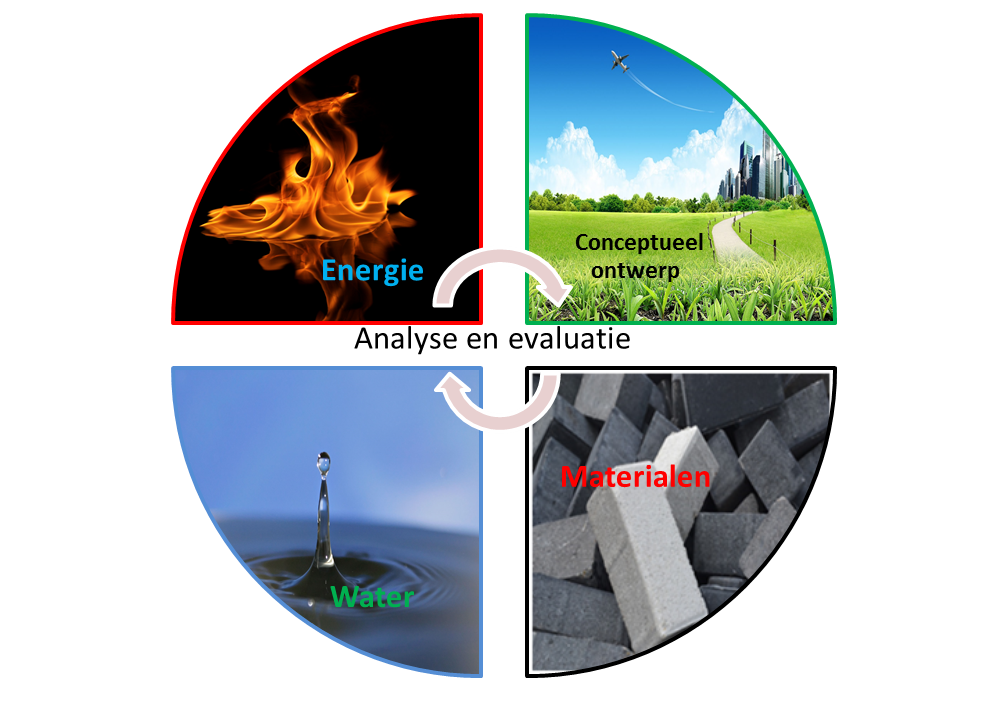Environmental Engineering and Sustainable Design
CT-MI-199
On the one hand this minor focuses on techniques and systems that prevent environmental impact, such as a plant for water or flue gas cleaning, recycling, or biomass processing. On the other hand it focuses on an integrated design that takes into account the future of available resources for water, energy and materials. Examples of sustainable design are reducing the use of raw materials, recovering materials from slurry or solid waste, recycling old building materials, or reusing old products or structures. Dominant concepts are circularity, renewable materials and renewable energy. We also stimulate the search for synergy in the integrated design between the traditional subsystems for water, energy and materials. But also synergy with external systems, such as the use of locally available building materials or energy sources, or exchanging/coupling them with external parties within the region where your design system is planned. In Q1 you will gain the knowledge and necessary depth about the available techniques, resources and sustainability, and apply this in Q2 in a group of students in a multidisciplinary final assignment.

Civil Engineering and Geosciences Language: English (some courses or lectures are in Dutch) Max. participants: 30 (min. 15)
|
Education methods
Lectures and projectsFor whom?
All TU Delft BSc students who feel confident about their basic knowledge of processes, chemistry, heat theory, mechanics, mathematics. The minor is also interesting for students from outside TU Delft with a similarly solid technical background.
What will you learn
The final assignment concerns a practical design of an engineering (sub-) system that can meet the environmental requirements. This piece of engineering is then embedded, and adjusted where necessary, to also meet sustainability requirements. The complete procedure runs from basic concept to detailed design, where specifications of the use of space, water, materials, energy, environmental impacts and economic aspects (purchase, maintenance, costs) receive the necessary attention. Within each group, this requires some control of the different disciplines. Depending on the nature of the projects offered, an extra workshop can be arranged to convey specific knowledge and calculation skills. The case for the final assignment is formulated such that engineering and sustainability are covered and, if necessary, two responsible teachers will be added per group to supervise. For questions please contact the minor coordinator.
After this minor the student will:
- Have knowledge of technologies and systems dedicated to protecting the environment.
- Have knowledge of sustainable principles, such as circularity, recycling, reuse and renewable resources.
- Be able to apply life cycle analysis to assess environmental impacts of a technical design.
- Be able to apply the knowledge and skills taught in this course to come to an effective integral (prototypal) design.
- Be acquainted with the urgency to save strategic resources of water, energy and materials.
- Be acquainted with the advantages of striving towards synergy in the design of different technical systems.
Course overview
- CT3602: Analysis of materials, energy and water flows (5 ECTS, Q1)
- CT3603: Solid waste to secondary material resources (5 ECTS, Q2)
- EE3105TU: Sustainable Energy Technologies, (EWI, 3 ECST, Q1)
- CTB2121: Urban water & Environmental Technology (CT, 5 ECTS, Q1)
- CT3604: Biomass nutrients and energy conversion (2 ECTS, Q1)
- CT3601: Final project: research group assignment (10 ECTS, Q2)
NOTE: CT students have already followed course CTB2121. Instead they will follow this course:
- AR0097: Climate proof sustainable renovation (BK, 5 ECTS, Q1)
Contact
Maarten Bakker
- +31 (0)15 27 85219
- M.C.M.Bakker@tudelft.nl
-
Faculty of Civil Engineering and Geosciences